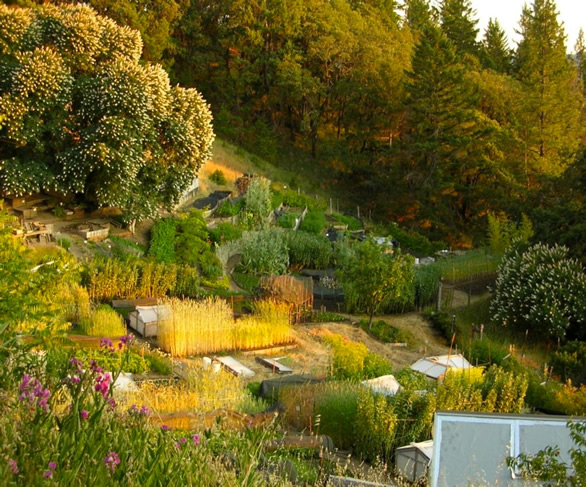Jeavons Center Mini-Farm Report This year at Ecology Action, we have chosen to make it a "growing season." We will not be hosting our annual 6-month internship in order to create a new and expanded 8-month program in 2016. The goal of extending our program is to provide interns with even more tools to aid success when they return to their home projects. This will include, but is not limited to, leadership and management training, fundraising skills, practice in observation, and a focus on a whole-systems perspective. We are placing a particular emphasis on honing our ability to be active observers in the garden this season. Why, you may ask? Why do we need to observe? We can just follow the directions in How to Grow More Vegetables (HTGMV) and grow our whole diet on less land then we ever thought possible, right? Well, we all wish it was that simple. But for anyone who has worked in a garden, things don't often go as planned. There are unexpected frosts and pests, poor germination of seed, strong winds that blow down a crop, or things that just die for no apparent reason. When we work within a living system, the unexpected will sometimes occur. Therefore, the way we can prepare ourselves to deal with this is simply to observe the natural processes that occur around us. Through this observation, slowly over time, we learn to see patterns better and intuit the wants and needs of the garden. Observation and attention to detail are what make one great in any pursuit. What makes an amazing woodworker or a fine artist? It's that perfectly level beam, or the subtle change of a line that makes everything pop. Attention to these details is what allows you to excel. They become particularly important when working within a natural system and even more so when trying to do it intensively. If we want to reduce the amount of space used, we need to be as efficient as possible. We can do this by observing and choosing the strongest transplants. We need to evaluate and feel our soil often to learn how to water the optimal amount. We must watch how plants grow and then save seed to perpetuate the varieties that thrive in our microclimate. We must keep things clean and organized to ease the mind and create a pleasing aesthetic for the soul. Therefore, through this practice of observation our hope is to more effectively provide interns with the skills needed to adapt the knowledge gained here in Willits to whatever climate, soil, or situation they are working in. We also hope to tap into the core philosophy behind the GB method which states: Through embracing this perspective—that we are an influential part of the whole universe and that through this connection we have the ability to impact the world around us—not only can we become empowered gardeners, but we hold the power to make the world a better place every day just by tending our gardens.
top | Newsletter Home | Article Index | Archive
|



